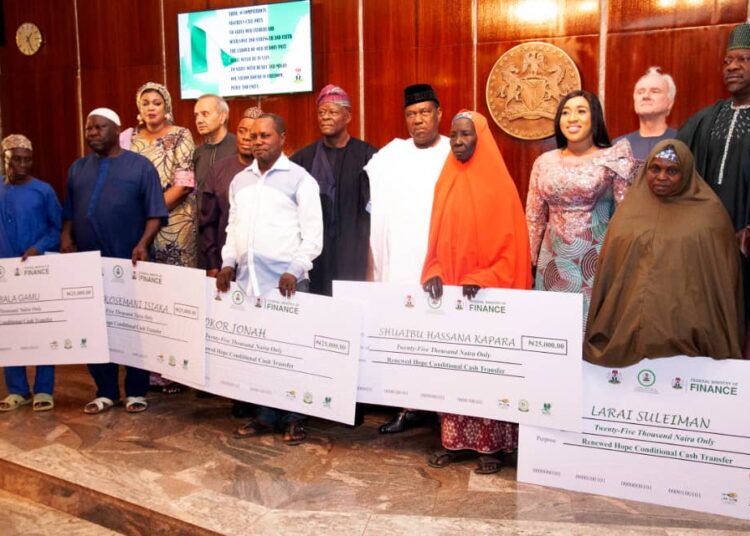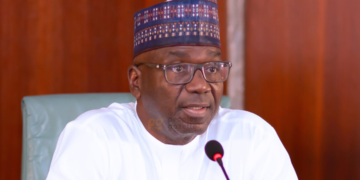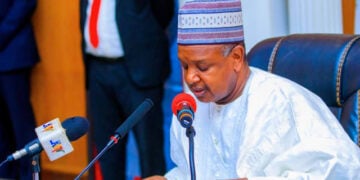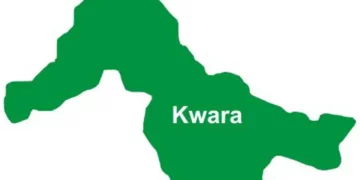In a move to alleviate the impact of fuel subsidy removal and tackle economic shocks, President Bola Tinubu has launched the Renewed Hope Conditional Cash Transfer programme.
He was represented at the launch by the Secretary to the Government of the Federation (SGF), George Akume, which held during the International Day for the Eradication of Poverty and the flag-off of the Renewed Hope Conditional Cash Transfer, at the Presidential Villa, Abuja on Tuesday.
The President said the flag-off the Renewed Hope Conditional Cash Transfer programme is for 15 million households targeted at uplifting poor and vulnerable Nigerians.
Tinubu said the theme of this year’s commemoration; “Decent Work and Social Protection: Putting dignity in practice for all” was no doubt in perfect alignment with the Renewed Hope Agenda of his administration.
He said: “My government will lead from the front in seeking to ensure that all Nigerians have opportunities decent for dignified work and sustained social protection.
“It is only via a sustained collaborative approach that we can win this war against poverty in Nigeria and the world at large. Hope is here. I ask the Nigerian people to please ensure that they key into all the available programmes because they are here to help.
“Our objective is to lift millions of Nigerians out of poverty. Yet, this will only be possible with the cooperation of the people we seek to help. Let us continue to work together to achieve our collective goal of eradicating poverty in Nigeria.”
On her part, the Minister of Humanitarian Affairs and Poverty Alleviation, Betta Edu, commended President Tinubu for providing the opportunity for 15 million households to benefit from the conditional cash transfers.
According to her, the world over, conditional cash transfers are effective forms of intervening in terms of pulling people out of poverty and providing that immediate cushioning for whatever economic shock that they might be going through.
She said: “as we speak right now, the first phase of the payments have already begun, the persons who are presented with the plaques today can actually attest and show the evidence that they have received their monies. They were gotten from the National Social Register. Verification has been ongoing in the last three weeks.
“And Nigerians that are on that register have been verified with their Biometrics Verification Number (BVN), National Identification Number (NIN), as well as all the forms of in person verification at the points of their household, to verify that they did the bracket and that meets all the criteria within the checklist that’s required to help them get this funded.
“Remember that it would be an expansion of this register, which would carry the vulnerable pensioners, veterans and wives of fallen heroes, as well as other areas of concern where they were not fully captured, but however, we are starting. And what we are starting with are those that have been verified across all the states in Nigeria.
“Verification process is still ongoing. And so for the first set that have been verified they will receive their money immediately. Subsequently, orders were verified to receive the money. But what we can assure Nigerians is the fact that this is a very transparent system that is traceable from the CBN account directly to the account of the beneficiaries.
“For Nigerians who do not have accounts and do not have the NIN, we are actually working to open accounts or money wallets for all of the persons so that they can have the money sent directly to them.
“We would equally be pasting out the list of beneficiaries at the different communities so that people who are beneficiaries can actually go there and check for their names and know that they qualify to be beneficiaries.
“It’s a transparent process it is one that we believe will be beneficial to Nigerians at all levels. We want Nigerians to continue to keep fits with President Bola Ahmed Tinubu, as he is poised to actually eradicate poverty from Nigeria. He has a seven year plan, which of course is aligned with the SDG 2030 limits.”
The Finance Minister and Coordinating Minister of the Economy, Wale Edun, emphasised the pressing issue of poverty in Nigeria, highlighting that 63% of the population living in poverty was unacceptable.
He stressed that poverty reduction is a top priority, and government initiatives have proven effective in stabilising the economy and enhancing productivity to improve the lives of Nigerians.
Edun also underlined the importance of improving customs management and implementing social safety nets, especially for vulnerable individuals, which the President has championed.
He explained that the audit trail, using biometrics, will ensure efficient and transparent distribution of support to the people.
The Country Director for Nigeria, Shubham Chaudhuri, highlighted the significance of collaborating on Nigeria’s conditional cash transfer programme, particularly praising Edu for her efforts.
He acknowledged Nigeria’s bold decision to eliminate fuel subsidies, emphasising that redirecting funds previously spent on these subsidies could be used for essential services like healthcare, education, and rural infrastructure.
The Country Director lauded the move as a step toward a better future for Nigerians, even though it came with certain hardships, including changes in fuel and food prices.
Chaudhuri commended Nigeria’s commitment to relieving short-term hardships and expressed willingness to provide high financing for relief measures.
He emphasised the importance of cash transfers as an effective means of supporting the poor and vulnerable, preventing them from making difficult decisions with long-lasting consequences.
The Country Director highlighted the necessity of robustly delivering cash transfers to ensure they reach those in need, expressing the World Bank’s commitment to supporting these efforts and encouraging accountability among stakeholders.
Some of the beneficiaries present at the event were Okor Jonah, Larai Suleiman, Shuaiabu Hassana, Sarki Bala Gamu, and Hameed Kosemani Isiaka.





